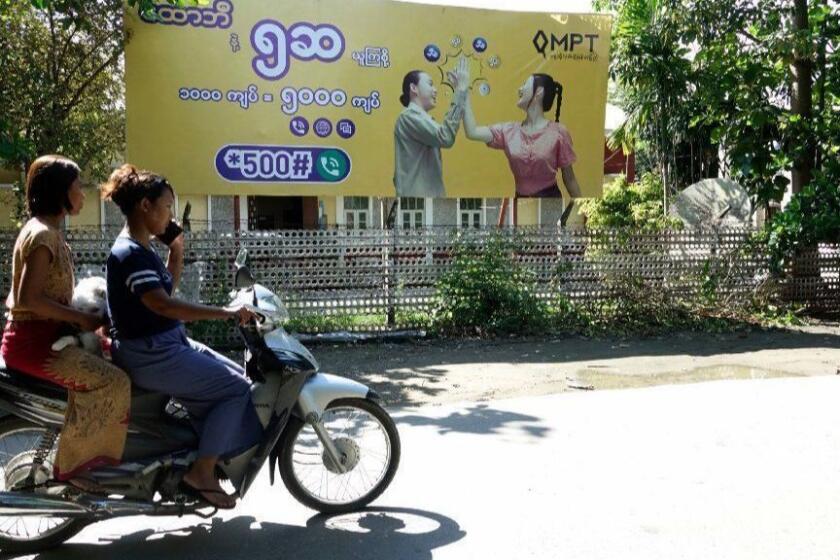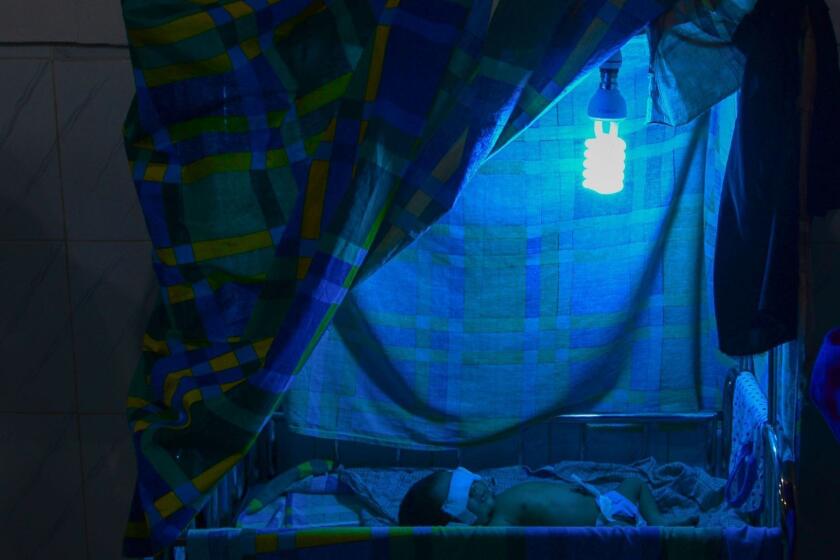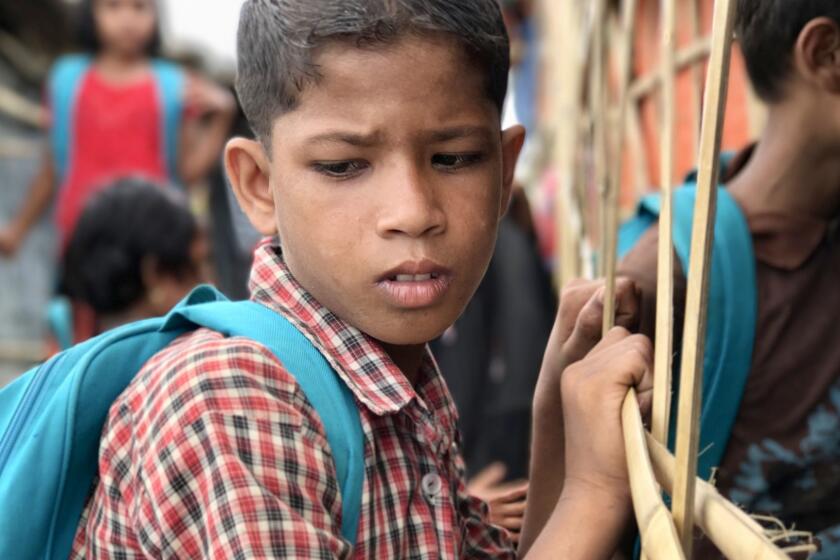‘We live like animals’: Refugee leader gives Rohingya a voice
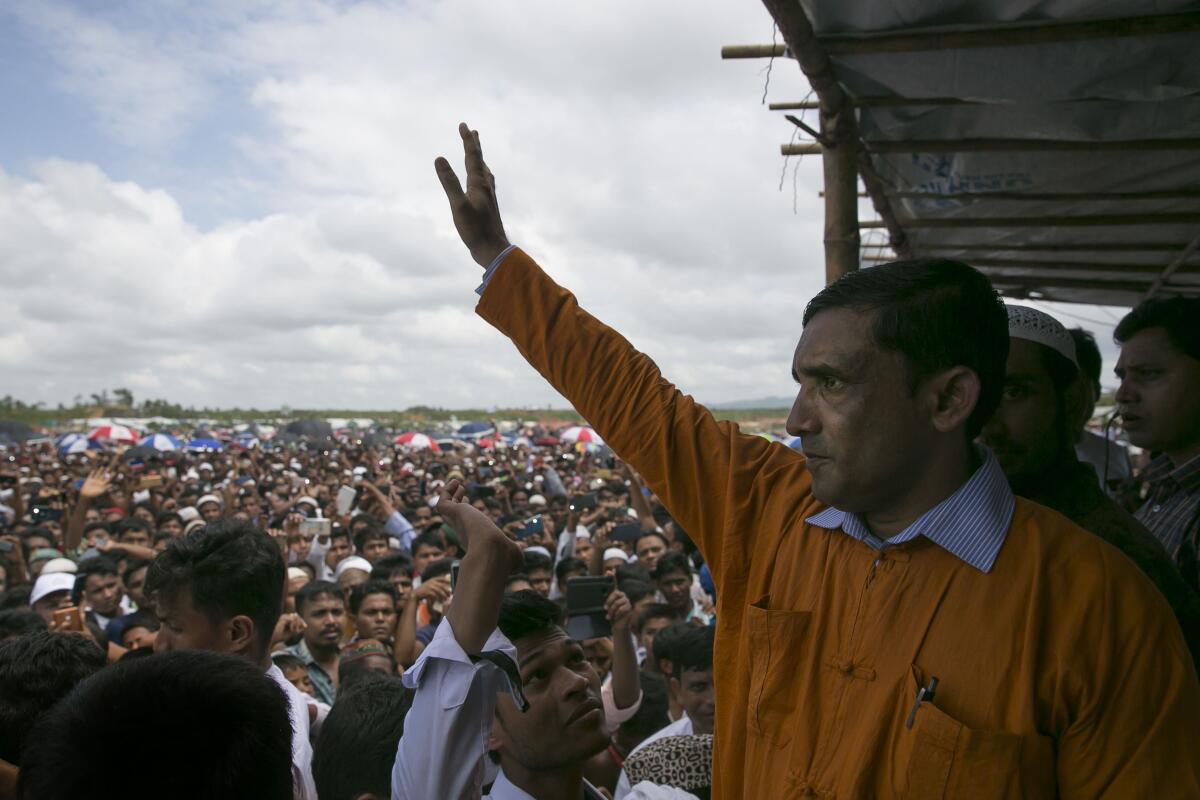
- Share via
COX'S BAZAR, Bangladesh — Hundreds of thousands of Rohingya refugees who fled mass slaughter in Myanmar listened somberly as former teacher Mohib Ullah spoke about their homeland while at a camp in southern Bangladesh.
Ullah, who has emerged as a Rohingya leader trying to galvanize international, political and financial support for the refugees, had stepped onstage at the world’s largest settlement of refugees. It was Aug. 25, the second anniversary of the start of a slaughter of minority Rohingyas in Buddhist-majority Myanmar’s Rakhine state. After an imam led a prayer and some refugees sobbed, Ullah took the microphone.
“We want to return home, but with dignity and safety,” he told the crowd.
Nearly 800,000 Rohingya fled Rakhine state for Bangladesh after a military-led crackdown that the United Nations has termed a “textbook example of ethnic cleansing.”
Marooned in Cox’s Bazar along Bangladesh’s southeastern border, the refugees are seeking guarantees of safety, freedom of movement and a pathway to citizenship before they will return to Myanmar, also known as Burma.
Systematically persecuted since 1982, when the Buddhist-led government stripped them of citizenship, the Rohingya saw their suffering worsen dramatically two years ago when insurgents calling themselves the Arakan Rohingya Salvation Army attacked 30 Myanmar police posts and an army base in northern Rakhine, killing 12 members of the security forces. Myanmar’s military and Buddhist mobs launched attacks against Rohingya villagers, who have described mass killings, rape, mutilation and arson.
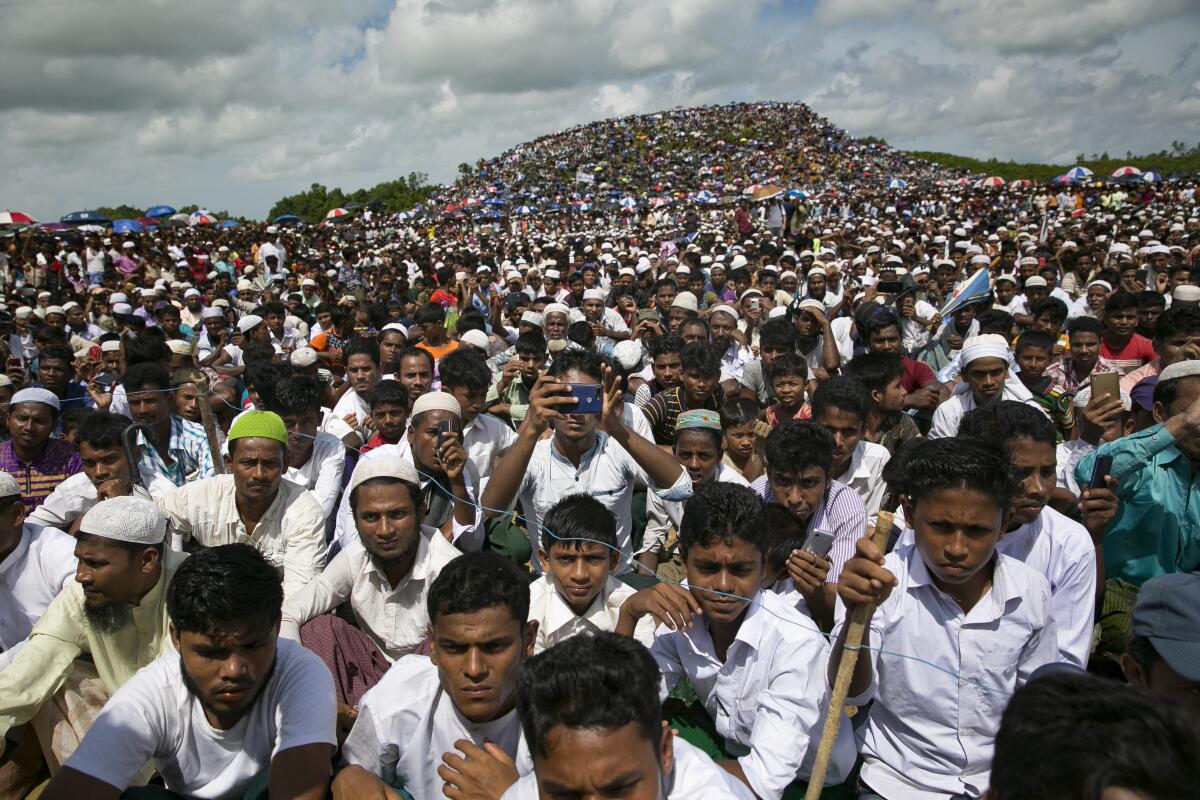
Ullah and his advocacy group, the Arakan Rohingya Society for Peace and Human Rights, are at the center of a Rohingya political awakening beginning in the relative safety of the refugee camps, which house about 1.2 million people who have fled successive rounds of violence in Myanmar.
Last month, many Rohingya were panic-stricken over the announcement of a repatriation process that the refugees vehemently oppose, fearing Myanmar remains too unsafe for return. A peaceful protest, led in part by Ullah, resulted in the postponement of plans to return a small number of refugees to Myanmar.
A week after speeches and protests marking the crackdown, the Bangladeshi government imposed restrictions on the use of cellphones in the camps, blocking mobile internet service — the primary way refugees communicate — from 5 p.m. to 6 a.m. Officials said the move was aimed at improving security, but refugees said it would leave them even more vulnerable and make it harder to communicate with family members outside the camps.
For civilians in Myanmar’s Rakhine state — who have survived army-led massacres, violence by ethnic militias, restrictions on humanitarian aid and the forced displacement of hundreds of thousands of neighbors — life just got more difficult.
Activists say Bangladesh is penalizing the Rohingya for opposing the repatriation plans. In an interview, Ullah said that the Rohingya were blindsided by the repatriation effort and accused U.N. humanitarian officials of failing to communicate with them.
“For 70 years, the Myanmar government didn’t discuss anything with us,” Ullah said, referring to the period since independence from Britain. “Now, Bangladesh and U.N. don’t discuss anything with us.”
Matthew Smith, chief executive of the advocacy group Fortify Rights, said that many Rohingya got their first taste of freedoms in Bangladesh — such as the right to pray, congregate, express themselves and speak to the press — “and now the authorities want to tamp that down.”
Ullah’s rejection of violence has also made him the target of death threats by Arakan Rohingya Salvation Army militants and their sympathizers in the camps. The militants are believed to have abducted and tortured at least five refugees, according to Fortify Rights, which has extensively documented crimes against the Rohingya.
“The government says they’re concerned about national security, but this move raises all manner of protection concerns for the Rohingya, and in turn Bangladesh,” Smith said. “The authorities would essentially be handing over certain aspects of life in the camps to militants. Cutting mobile access will make the camps less secure.”
Ullah, 44, spent a decade as a private tutor in Rakhine state. As the Rohingya steadily lost their rights, many children did not have access to education. Ullah, a botanist by training, could not find a job.
He and his family — his wife, his parents and nine children ages 17 years to 9 months — were at home in Rakhine awaiting a feast on the Muslim holiday of Eid al-Adha when Myanmar’s military and Buddhist mobs launched the scorched-earth campaign against Rohingya villages in the state. The family spent a week huddled inside one room with the lights off, trying not to make a sound.
“They were shooting everyone on sight, even children,” Ullah said.
The 3-month-old boy has no name.
The deathly silence was punctured only by occasional police sirens until the day of Eid al-Adha, when soldiers announced on loudspeakers that the villagers could step out for prayers. That is when Ullah’s family escaped the village, two at a time, starting with his oldest sons. He was the last to leave with the youngest child, who was 9 months old.
The family walked for eight days to get to Bangladesh.
Once inside the camps, Ullah, already well known for his work as a teacher and his command of English, began assisting United Nations officials in interviewing refugees and documenting their allegations of atrocities.
When advocacy groups like Human Rights Watch were searching the camps for survivors of war crimes, Ullah assisted researchers by going from hut to hut, building a tally of killings, rapes and arsons. He shared his findings with investigators who are building a case against Myanmar that they hope will end up at the International Criminal Court, where military commanders could face prosecution for genocide, crimes against humanity and war crimes.
But Myanmar’s government, led by Nobel Peace Prize laureate Aung San Suu Kyi, has blocked efforts to hold the army accountable. The military denies committing crimes.
“Nothing has changed in the last two years,” Ullah said at his makeshift office, a small hut deep inside Kutupalong refugee camp, where his group is allowed to operate under the watch of Bangladeshi officials.
“We are alive, but we live like animals,” he said. “We have no human rights, no education. We don’t have enough water, enough toilets or safety. Nobody is fighting for us.”
Ibrahim Mohammad, a slight 10-year-old with a guarded manner, used to love school.
Activists say the militants have targeted refugees and scholars critical of their extremist views. In July 2018, a Rohingya religious leader was kidnapped from his shelter in a refugee camp after he coauthored a 21-page fatwa — an Islamic legal opinion — calling for peace and opposing violence by militants in Rakhine.
One night last month, Bangladeshi relief officials spirited Ullah out of the camp and took him to a safe house, where he spent the night before being brought back the next day.
“We had information that he was going to be killed that night,” said a Bangladeshi official who requested anonymity because he was not authorized to discuss the issue. “We had to get him out.”
Ullah said the refugees must stay united. He appealed to world leaders, invoking their common humanity.
“If they knew what we have been through,” he said, “they’d sympathize with us.”
Krishnan is a special correspondent.
More to Read
Sign up for Essential California
The most important California stories and recommendations in your inbox every morning.
You may occasionally receive promotional content from the Los Angeles Times.
